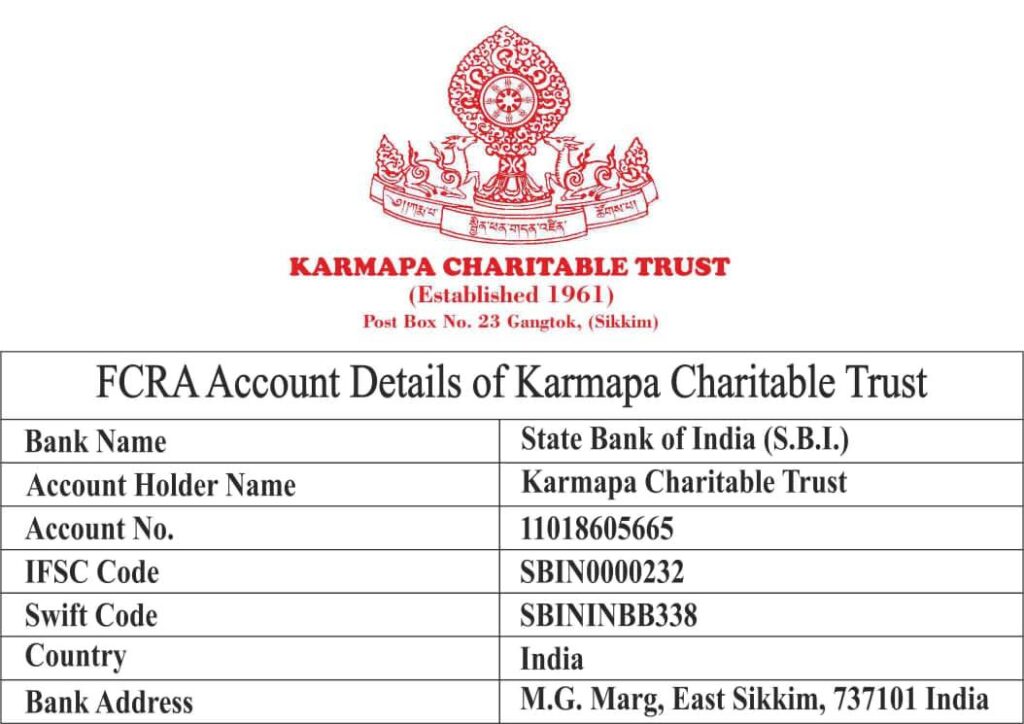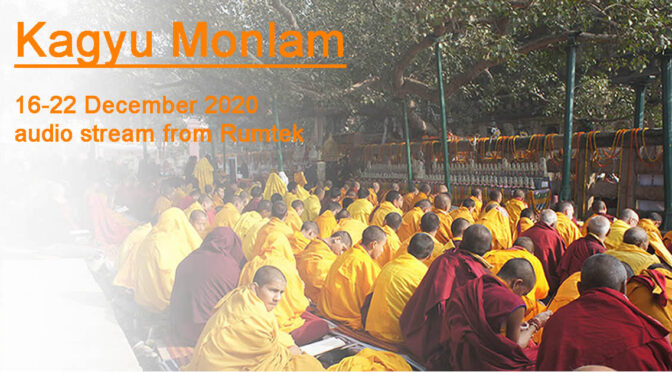噶瑪巴邀請學生一起參與噶舉祈願法會現場直播
November 23, 2020
第十七世大寶法王嘉華噶瑪巴分享有關今年12月16至22號舉辦噶舉祈願法會的訊息。
親愛的法友
我誠意邀請各位透過在隆德寺的現場直播,參加今年噶舉祈願法會。
令人遺憾的是,由於COVID-19疫情,迄今為止已有近5900萬人確診,超過130萬人和上百萬動物失去生命,我們今年無法舉行面對面式的法會。
不過,我感到我們很幸運,現有科技使我們能夠一起修習,我將與來自世界各地的你們一起參加祈願法會。
我想藉此機會與你們分享我對佛法的一些看法,尤其是祈願的修持。
當然這個每年一次以隆德寺僧伽為首,帶領我們念誦祈願文的法會是一個歷史悠久的傳統。
但是,如果我們真的對此活動深思並問自己目的是什麼,奇怪的是很難找到一個明確的答案。
作為人類,我們主要受到一種觀念來驅使我們做任何事情。這種觀念就是無論我們做什麼,都必須有一個目的,否則就毫無意義。儘管該理論有它的原因,但如果我們僅依靠這種邏輯,那麼對於我們來說找到一個很好的理由來持續像噶舉祈願法會這樣的一個傳統,是一種挑戰。
但是,我感到我們需要為此傳統感恩。
為什麼?
人類社會的運作模式使我們感到必須從事情中獲得一切,連最簡單的事情也需如此,即使我們從繁忙的日常工作中抽出五分鐘,我們也會感到內疚,除非我們認為自己獲得了可以享受這五分鐘的權利。
雖然佛教徒認為這種思維方式與事物本身和現實的本質並不一致,但是從佛教徒的角度來看,如果我們也是由這種必須獲得結果的理論,驅使我們做任何事情的話,那麼為了體驗我們相信的東西是不是真的,一直走下去就變得有其意義。
因此,從這個意義來說,任何的佛法修持就像是一種工具,使我們能夠完全按照自己相信的往前進。
這樣子,修行可以使我們的道路變得更完整。
如果我們從一開始就了解這一點,我們就不會被成功的想法所限制。在祈願時,我們不會從錯誤的觀念開始,以為我們必須要成功,因為成功的想法總是與失敗的想法密切聯繫在一起的。
因此,祈願的修持是一條使我們能夠探索自己的信念,而沒有任何承諾或保證結果的途徑,就像是「親自看一看,你相信的是不是就是這樣。」
換句話說,如果我們堅信我們需擔任佛教徒的角色,並且希望一直堅持下去,那麼我們就有很好的機會,今年連續7天,從12月16到22日,我們能夠將這角色完美的發揮。
因此,如果你想祈願,這裡是一個將祈願達到極致的平台!
利用此平台來探索你真正相信的東西,並充分享受它,不要期望成功或恐懼失敗。
全心全意地享受它。
我邀請大家與我們一起參加這次法會,讓我們以佛教徒的身份,沒有任何障礙。我們有唱誦師領唱,我們有導師來指導法會,可以這麼說,我們有樂器可以使你在適當的氛圍,我們有歌曲和旋律來表達我們的祈願。
讓我們聚到一起,並利用這種自由為所有眾生,尤其是那些受到疫情嚴重影響的眾生祈禱!
無需保持社交距離,也無需遮住嘴巴,只需透過電子屏幕和電子音響,我們便可以完美地發揮佛徒的身分,不用感覺我們正在執行某種使命。
但是,不要有是我要求或命令你們參加修持這樣的一個概念,令自己感到一種負擔。不要因為我們是佛教徒,就認為有義務去做或是不應該去做。
但是,如果你希望能親證自己遵循的信念會發生什麼事情,做得徹底且精進修行是合乎邏輯的唯一做法。
同時,你無需感到有任何負擔,因為祈願修持不需要像密勒日巴尊者這樣建九層大樓,也不需要像那諾巴尊者忍受十二大苦行與十二小苦行,也不用像悉達多太子多年修習苦行。
相反,你可以在舒適的家中探索祈願所帶來的潛能,這樣我們還能要求什麼?
因此,親愛的法友,請你們毫無疑問或猶豫,全心全意地享受,為一切有情而祈願!
Karmapa invites students to Kagyu Monlam audio stream
November 23, 2020
Thaye Dorje, His Holiness the 17th Gyalwa Karmapa, shares the following message regarding this year’s Kagyu Monlam, which takes place from 16-22 December.
Dear dharma friends
I would like to invite all of you to join this year’s Kagyu Monlam prayers via live audio stream from Rumtek.
It is regrettable that, due to the COVID-19 pandemic, with nearly 59 million cases, more than 1.3 million human lives and millions of animal lives lost so far, we will not be able to come together in person this year.
Nevertheless, I feel that we are very fortunate to have the necessary technology to allow us to practice together, and I will be joining the aspiration prayers along with all of you around the world.
I would like to take this opportunity to share some of my own thoughts with you, concerning Buddhist practice in general, and in particular the practice of aspirations.
Of course, we have this long-standing tradition of gathering once a year for the recitation of aspiration prayers, led by our monastic sangha from Rumtek.
But if we really investigate this activity and ask ourselves what the purpose is, curiously enough, it will be difficult to come up with a solid one.
As human beings, we are driven primarily by the concept that no matter what we do, there has to be a purpose – otherwise it is pointless. And while that theory has its own place, if we rely exclusively on that logic it might be challenging for us to find a good reason why we should keep up traditions such as the Kagyu Monlam.
Yet, I feel that we need to be thankful for this tradition.
Why?
Our human society functions in a way in which we feel that we have to earn everything, down to the simplest of things: even if we just take five minutes break out of our busy daily schedule, we feel guilty unless we think that we have somehow earned the right to enjoy it.
While Buddhism understands that this way of thinking is not really in line with the way things are, with the nature of reality – nevertheless, from a Buddhist point of view, if we are driven by the theory that every result must be earned, then it makes sense to go through with it all the way, in order to experience for ourselves whether what we believe is true or not.
So in that sense any Buddhist practice is like a vehicle to allow us to go all the way, fully, with what we believe.
In that way, the practice will complement what we think the path is.
If we understand this from the beginning, then we will not be driven by the idea of success; in the case of aspirations, we will not start out with the mistaken belief that we have to have a ‘successful’ aspiration, because this very idea of success invariably goes hand in hand with the idea of failure.
So the practice of aspiration is a path that allows us to explore our beliefs all the way, without any promise or guarantee for a result, like saying, “See for yourself whether what you believe is it – or not.”
In other words, if we hold the belief that we need to play the role of being a Buddhist, and we want to go all the way with it, then we have the perfect opportunity: this year, for seven days – from 16 to 22 December – we will be able to play that role to perfection.
So, if you wish to aspire, here is a platform to aspire to the fullest!
Use this platform to explore what you truly believe – enjoy it to the fullest, without any expectation of success or fear of failure.
Enjoy it wholeheartedly, with full freedom.
I invite all of you to join us – let us play at being Buddhist, without any hang-ups. We have the Umdzes to lead the chants; we have our disciplinary masters to direct and guide the performance; we have the musical instruments to put you in the right mood, so to speak; we have the songs and the melody to voice our aspirations as one.
So let us come together and use this freedom to pray for all sentient beings, and especially all those whose lives have been severely affected by the pandemic!
Without having to practice social distancing, without having to cover our mouths, through a digital screen and a digital sound box, we can play our Buddhist role to perfection, without feeling that we are on some kind of mission.
However, do not burden yourself with the notion that this is a request or a command from me to join this practice. There is no obligation for us to do this or not do this because we are Buddhists.
But should you wish to see for yourselves what happens if you follow your belief all the way, then it is only logical for you to be thorough and diligent all the way.
At the same time, there is no need for you to feel any sense of burden, because this particular practice of aspiration doesn’t require you to build any nine-storey towers like Milarepa, nor does it demand of you to endure the twelve minor and twelve major hardships of Naropa, nor to undergo years of gruelling ascetic practice like Prince Siddharta.
Instead, you can explore the full potential of aspirations from the comfort of your own home. What more could we ask for?
Therefore, dear dharma friends, aspire for all sentient beings, without doubt or hesitation, but with whole-hearted enjoyment!
Source:
Karmapa invites students to Kagyu Monlam audio stream
#Karmapa #Kagyu #Monlam
(中文翻譯由本中心翻譯小組負責。若有錯漏,請見諒。節錄或載列文章內容以原文為準。)

在噶舉祈願法會期間,歡迎善信隨緣樂助:
1)酥油茶:每份3000盧比(港幣 315.3)
2)茶點:每份7000盧比
(港幣 735.7)
3)供酥油燈:每份108盞
1500 盧比(港幣157.7)
4)供僧:每份供100人
25000 盧比 (港幣2627.5)
5)中午供僧膳食:每份50000盧比 (港幣5255)
6)全日供僧膳食:每份100000盧比 (港幣10510)
1 盧比 = 0.1051 港元(今日對換價)。以上只是參考價。
法會贊助:隨喜
聯絡方式如下:
Whatsap : +91-8617658907
電郵:thekagyumonlamchenmo@gmail.com
截止日期:12月14日

